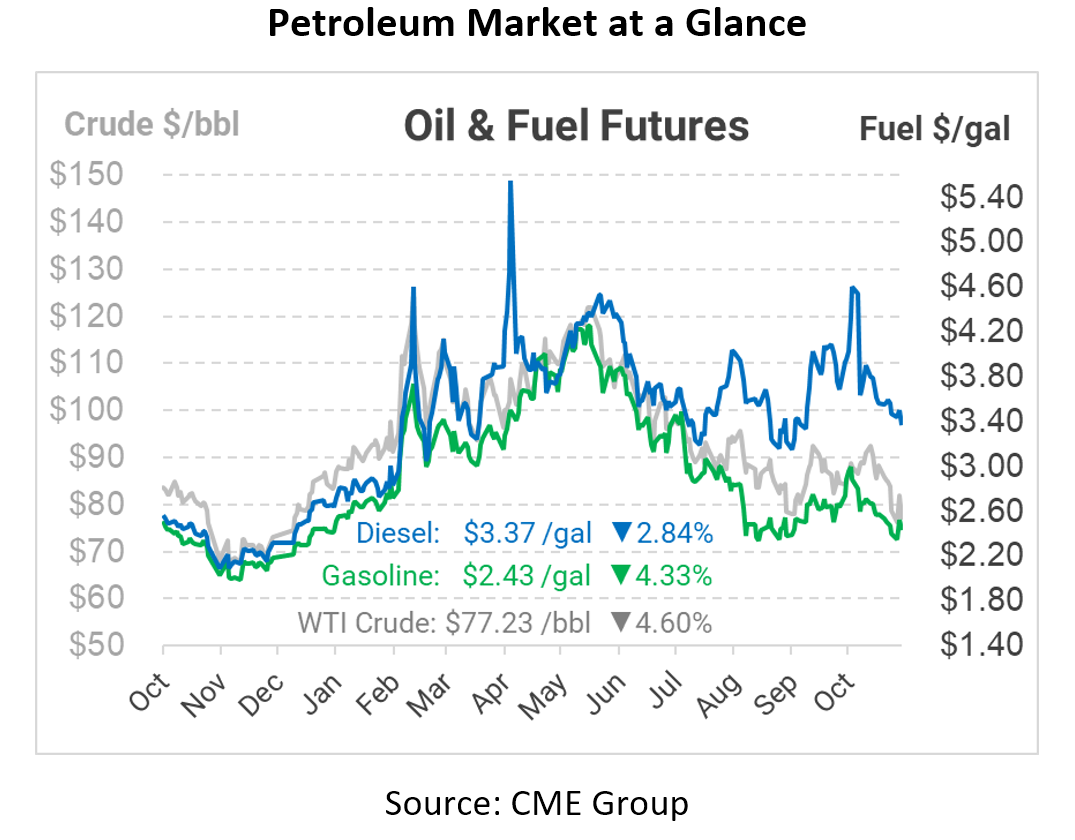
What Is It – Fleet Card
If you’re new to the fuel-purchasing world, you may be surprised to find out that there are many different ways to buy fuel. The three primary options are buying fuel in bulk for an on-site fuel tank, mobile fueling directly into your equipment, and buying fuel at a retail station. Today, we’ll be exploring this last option, retail fuel, and discussing the most common method used for buying retail fuel: a fleet card.
What Is a Fleet Card?
A Fleet Card, also called a fuel card, is a specialized credit card made specifically for fuel and maintenance purchases, allowing companies to more accurately track vehicle trends. Although some companies use a purchasing card (or P-Card) for all expenses, a fleet card provides more specialized benefits, including superior data, unique controls, and fuel discounts that vary by customer.
What Types of Fleet Cards Are There?
Fleet cards come in a variety of options based on how you buy fuel. There are three primary types of fuel cards that fleets can select:
Universal Retail Fleet Cards: Universal fleet cards offer access to nearly all gas stations, and are most popular for fleets with complex routes that may not know where they’ll fill up next. Universal cards often come with a percentage or cents-per-gallon discount.
OTR Fleet Cards: Over-the-Road Cards, or OTR Cards, are used at truck stops to get cash discounts at the pump. These cards are typically utilized by cross-country drivers who spend the majority of their time on highways. OTR cards may be brand-specific or could be issued by a bank with discounts at particular brands based on your volume.
Cardlocks: Cardlocks are non-staffed fueling locations where drivers can fill up their equipment quickly and leave. Cardlocks typically provide the lowest cost of fuel, since they don’t have personnel expenses. However, a cardlock is only accepted at locations within the network. Rather than having hundreds of thousands of fuel stations to choose from, a fleet may only have a few hundred or a few thousand to pick from. If your drivers frequently drive near a cardlock location, though, these can be an ideal option to save dimes on every gallon.
What Are the Benefits of a Fleet Card?
Fleet cards come with many benefits, boiling down to three primary benefits for users: Cost, Control, and Convenience.
Cost. Fleet cards are an effective way to lower fuel costs. Depending on the type of fuel card you select, you can enjoy either a percentage-based discount, a cash discount, or a negotiated cost-plus rate with a merchant.
Control. Fleet cards give fleet administrators much better control over purchases compared to P-cards. If your drivers are in diesel trucks, you can restrict any gasoline purchases to make sure they’re not filling up their minivan on the weekend. You can also limit purchases to only during business hours, or in certain areas. If your fleet uses gasoline, you can prevent drivers from paying more for premium gasoline. All of these controls and more can be established in advance, and can either deny the driver at the pump or allow the transaction but log an exception for later review.
Convenience. With roughly 115,000 gas stations around the US, retail fuel purchases are incredibly convenient. Many universal fleet cards are accepted at 95% or more of retail fueling locations. Although cardlocks and OTR cards are more limited, they also boast numerous locations around the US and/or Canada for purchases. Every purchase is tracked and reported digitally, making it easy and efficient to monitor purchases and identify exceptions.
What Kind of Businesses Use Fleet Cards?
All kinds of customers can be a candidate for fleet cards. If your drivers fill up over the road, and don’t often return to the same location each day, then a fleet card may be your only option. Businesses large and small can benefit from the controls, cost reduction, and convenience of a fleet card.
If I Buy Bulk Fuel, Do I Still Need a Fleet Card?
If you have a bulk tank at your site, it may still be helpful to have a back-up fleet card on hand for your drivers. If your drivers have to run particularly long routes (say, after-holiday trash collection), it may be cheaper to pay retail prices rather than commute back to your tank to fill-up. Of course, you’ll want to monitor carefully so drivers don’t buy retail fuel along their route to save time, costing the company 10-20 cpg more.
A fleet card can also be a strategic plan during emergencies. As hurricanes approach, utilizing a fleet card can help you conserve your site’s fuel, ensuring you have plenty of fuel on hand once the storm has passed. For these situations, it’s best to have the fleet card on hand and activated long before the storm comes, so start the conversation now with your fuel supplier.
This article is part of Daily Market News & Insights
Tagged:
MARKET CONDITION REPORT - DISCLAIMER
The information contained herein is derived from sources believed to be reliable; however, this information is not guaranteed as to its accuracy or completeness. Furthermore, no responsibility is assumed for use of this material and no express or implied warranties or guarantees are made. This material and any view or comment expressed herein are provided for informational purposes only and should not be construed in any way as an inducement or recommendation to buy or sell products, commodity futures or options contracts.





